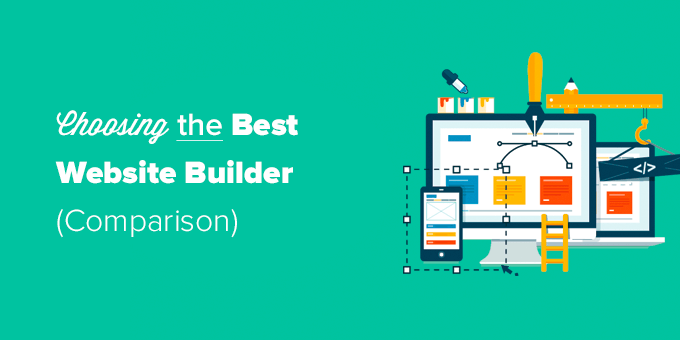Guide on How a Website Builder Works and How to Leverage it

Building a website used to be a task reserved for tech-savvy individuals or those with the budget to hire a professional. Thankfully, website builders have revolutionized the process, making it accessible to everyone.
But how exactly do these tools work, and how can you make the most of them?
This guide will walk you through the basics of how a website builder operates and provide tips on leveraging its features to create a stunning and effective online presence.
Whether you’re a small business owner, a freelancer, or someone looking to establish a personal blog, understanding how to use a website builder can save you time, money, and a lot of headaches.
Let’s dive in and explore the world of website builders.
Understanding Website Builders
What is a Website Builder?
Simply put, a website builder is a software or platform that allows individuals or business owners to create their websites without coding or web development skills. Website builders simplify the process of building a website by providing pre-designed templates, drag-and-drop functionalities, and a user-friendly interface.
How Does a Website Builder Work?
Most of the website builders that we use today are based online, meaning they are accessible via the internet. They are designed to help you easily create a website without any prior HTML or CSS knowledge. In essence, a website builder takes the drag-and-drop actions you perform on the platform and converts them into code. The result? A fully functional and professionally designed website.
Common Features of Website Builders
Website builders come with a variety of features to make the website creation process easier:
- Drag-and-Drop Editor: Allows you to design and customize your website by simply dragging and dropping elements.
- Pre-Designed Templates: Offers a range of templates to choose from, so you don’t have to start from scratch.
- Content Management System (CMS): Enables you to create, edit, and publish web pages like blogs and product pages.
- Responsive Design: Ensures your website looks good on all devices, including mobile phones and tablets.
- SEO Tools: Helps you optimize your website for search engines to improve visibility.
- E-commerce Capabilities: Provides features like shopping carts and payment gateways for online stores.
Website builders are essential tools for entrepreneurs, making the process of constructing a website easier and reducing the cost and stress associated with traditional web design.
Choosing the Right Template
Types of Templates Available
A template decides the look and feel of your website, so you’d want to pick one that aligns with your branding. Hostinger offers 150 responsive templates for various niches, all made with mobile optimization in mind. They ensure your website is mobile-friendly, offering a consistent user experience on desktop and mobile devices.
Factors to Consider When Choosing a Template
When selecting a template, consider the following factors:
- Responsiveness: Ensure the template is mobile-friendly.
- Customization Options: Look for templates that allow you to easily add and edit text, images, videos, and other content.
- Design and Layout: Choose a design that aligns with your brand and the type of content you plan to publish.
- Loading Speed: Opt for templates that are optimized for fast loading times.
- SEO Friendliness: Select templates that are built with SEO best practices in mind.
Customizing Your Template
Once you’ve chosen your preferred template, you can customize it further to suit your preferences. You can add and edit text, images, videos, and other content. And with the drag-and-drop editor, you can easily rearrange and customize any elements on your site, including the fonts and colors.
Customizing your template allows you to create a unique and personalized website that stands out from the competition.
Adding Content and Features
Creating and Managing Content
Creating and organizing content is a crucial step in building your website. Start with essential pages like the homepage, About page, and contact page. Content creation can be time-intensive, often taking 1 to 3 weeks or longer. It’s important to create valuable and engaging content that establishes your expertise. Consider using a content upload calendar to manage ongoing content updates.
Integrating Functionalities
Website builders allow you to incorporate various features and functionalities into your site. This can include:
- Contact forms
- Social media integrations
- E-commerce capabilities
- Booking systems
These features can enhance user experience and provide additional value to your visitors.
Using Add-Ons and Plugins
Many website builders offer a range of add-ons and plugins to extend the functionality of your site. These can include SEO tools, analytics, and marketing integrations. Choose add-ons that align with your website’s goals and needs.
Leveraging the right features and functionalities can significantly improve your website’s performance and user engagement.
Domain and Hosting Essentials
Selecting a Domain Name
A domain name is a unique address, such as “hostinger.com”, which lets internet users visit your website. It’s a key element of your branding strategy, representing the first interaction website visitors have with your online presence. When you choose a domain, you have two pieces of the domain to consider — the custom phrase that comes before the “dot” and the domain extension. The domain extension includes the “dot” and the letters after it. In these examples, the domain extension is in bold.
- domainname.com
- domainname.org
- domainname.net
Choosing a Hosting Provider
With a domain locked in, you can now continue your site designing journey by settling on a good hosting company. But first, what is a hosting company, and why do you need one? Website hosting is the server space and resources that store a website’s files and data. Think of it this way: Your website is like a house. Your web hosting is the land the house sits on. And the domain is the street address.
Connecting Your Domain to Your Website
Once you have both a domain name and a hosting provider, the next step is to connect the two. This usually involves updating the Domain Name System (DNS) settings to point your domain to your hosting provider’s servers. This step is crucial for making your website accessible to the public. Most hosting providers offer detailed guides and customer support to help you through this process.
Ensuring that your domain and hosting are properly set up is essential for a smooth and professional online presence.
Optimizing for SEO and Analytics
Basic SEO Practices
Optimizing your website for search engines, also known as search engine optimization (SEO), boosts its chances of showing up in search engine results pages as visitors browse for relevant keywords in your niche. It’s a continuous process that brings your site traffic and conversions without paying for ads. Refreshing your content periodically with up-to-date information, new visuals, and trending keywords is one way to enhance online visibility. This is especially important for dynamic sections in your website, like blog posts and product pages, where new content can drive more traffic and improve conversion rates.
Using Built-In Analytics Tools
Most website builders come with built-in analytics tools that help you track your website’s performance. These tools provide insights into visitor behavior, page views, and conversion rates. By analyzing this data, you can make informed decisions to improve your website’s user experience and content strategy.
Regularly reviewing your analytics data allows you to identify trends and areas for improvement, ensuring your website remains competitive.
Improving Website Performance
Improving your website’s performance is crucial for both SEO and user experience. Ensure your website loads quickly, is mobile-friendly, and has an intuitive navigation structure. You can easily change your metadata, keywords, and tags and optimize your site for mobile devices through SEO functionality. Some site builders also have built-in marketing features, such as email marketing, allowing you to reach your target audience with ease.
Steps to fine-tune your website’s look on search engine result pages:
- Go to Website settings → SEO from the sidebar to access all the customizable search engine optimization settings.
- A yellow exclamation mark by a page title indicates missed SEO opportunities. Click the highlighted title to optimize it.
Benefits of Using a Website Builder
Time and Cost Efficiency
Website builders are incredibly cost-effective. Using a special platform, you can save costs on hiring a website designer. They offer free plans and cost-friendly packages that eliminate the need for expensive web development services. Additionally, pre-designed templates and themes enable you to create your site fast, significantly reducing the time spent building a website compared to hiring a web designer.
Ease of Use
Some free website builders are user-friendly and require no coding skills. This makes them accessible to business owners who may not have technical expertise. The intuitive drag-and-drop interfaces allow you to design stylish websites without knowledge of the code. Moreover, you can always make necessary changes if you see some drawbacks later.
Scalability and Flexibility
With a site creator, you can save time and adjust the design of your website at any time. The template designs provide a professional and aesthetically appealing starting point. Furthermore, website builders are low maintenance and don’t need constant upkeep. You can also use a custom domain name or your registered domain, making it easier for customers to recognize and find your site.
Now that you know why you should use a website builder for your business, it’s time to figure out how it works. It will help you decide whether it suits your purpose.
Tips for Selecting the Best Website Builder
Evaluating Ease of Use
When selecting a website builder, one of the first things to consider is how user-friendly the platform is. A good website builder for small businesses should have an intuitive interface that allows you to create and manage your site effortlessly. Look for features like drag-and-drop editors, pre-designed templates, and easy-to-navigate dashboards.
Comparing Pricing Plans
Pricing is a crucial factor when choosing a website builder. Most platforms offer various pricing tiers, each with different features and limitations. Here’s a quick comparison of what you might expect:
| Plan Type | Features Included | Price Range |
| Free | Basic templates, limited storage, ads | $0 |
| Basic | Custom domain, more storage, no ads | $5 – $15 per month |
| Premium | Advanced features, e-commerce capabilities | $20 – $50 per month |
| Enterprise | Full customization, priority support | $100+ per month |
Assessing Customer Support
Reliable customer support is essential, especially if you’re new to website building. Check if the platform offers multiple support channels such as live chat, email, and phone support. Additionally, look for resources like tutorials, FAQs, and community forums.
Good customer support can save you a lot of time and frustration, making your website-building experience much smoother.
By considering these factors, you can choose a website builder that best suits your needs, budget, and skill level.
Conclusion
Website builders have revolutionized the way individuals and businesses create their online presence. By offering user-friendly interfaces, drag-and-drop functionalities, and a plethora of customizable templates, these tools make web development accessible to everyone, regardless of technical expertise. Leveraging a website builder not only saves time but also provides the flexibility to update and enhance your site as your needs evolve. As you embark on your journey to build a professional and functional website, remember to choose a platform that aligns with your business goals, offers robust support, and fits within your budget. With the right website builder, the possibilities are endless.
Frequently Asked Questions
What is a website builder?
A website builder is software that allows users to create a website without needing to know how to code. It typically includes a drag-and-drop editor, enabling users to add elements and customize their site easily.
How does a website builder work?
Website builders usually work online and allow you to create a website by dragging and dropping elements into place. The builder converts these actions into code, resulting in a fully functional website.
What are common features of website builders?
Common features include drag-and-drop functionality, pre-designed templates, hosting and domain services, add-ons and plugins, and built-in SEO and marketing tools.
What should I consider when choosing a template?
When choosing a template, consider the type of website you want to create, the design and layout, customization options, and how well it aligns with your brand’s identity.
Can I add custom functionalities to my website?
Yes, most website builders allow you to integrate various functionalities through add-ons and plugins, such as e-commerce capabilities, contact forms, and social media integrations.
Do I need a separate hosting provider if I use a website builder?
Many website builders offer hosting services as part of their package, so you may not need a separate hosting provider. However, it’s essential to check the features and limitations of the hosting service provided.




